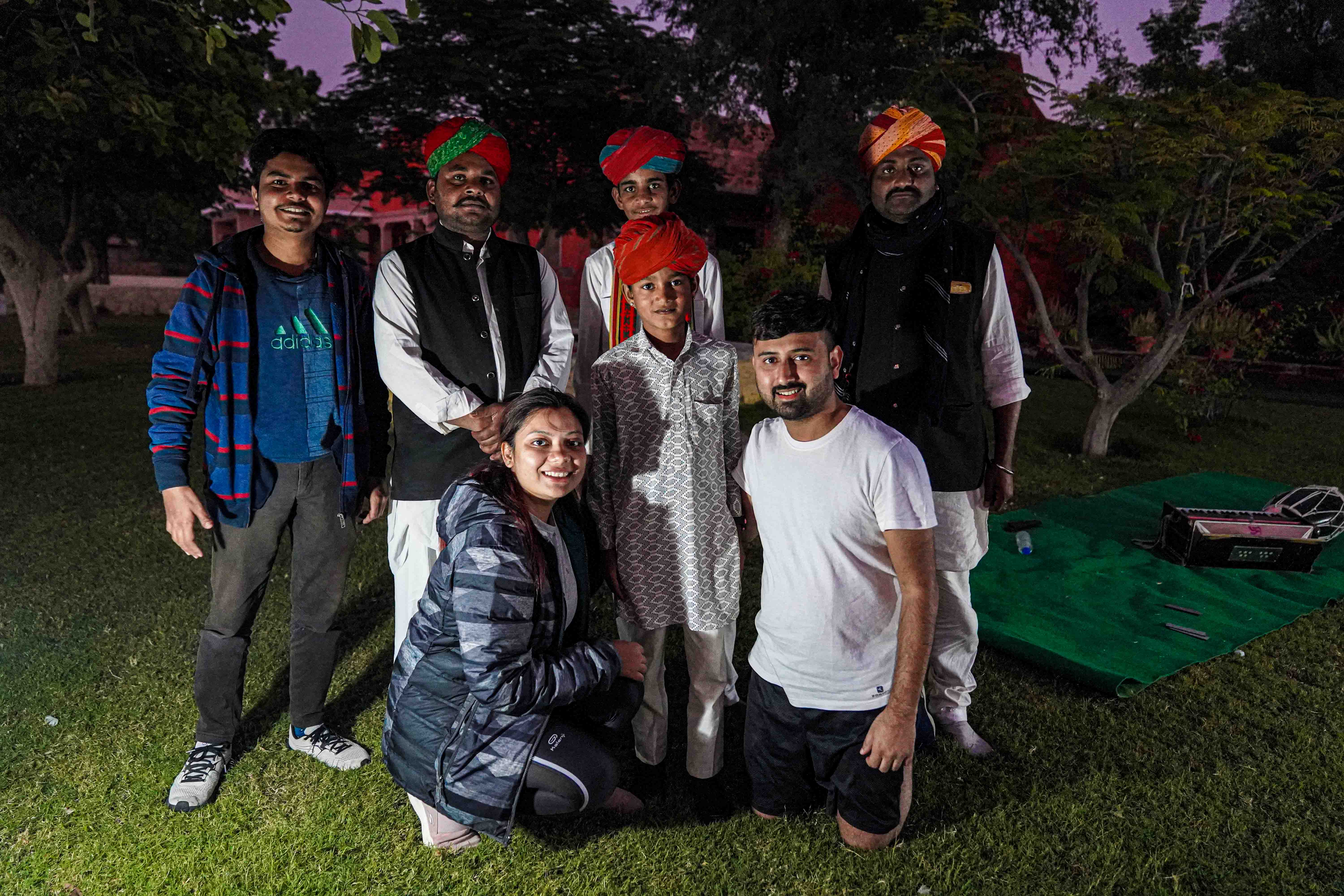
With the grand backdrop of Jawahar Niwas in Jaisalmer, Jalal Khan and his group laid out their set up of instruments and worshipped then before placing on the carpet. It was such a beautiful sight to see all the artists who are Muslims, pay respects to their instruments by keeping a picture of Goddess Saraswati in front of them. The artists before anything said their prayers and then began with their song:
Aiso re din aaj ro
(Today is the kind of day)
Aiso nito nit hoy
(Which is nothing like other days)
Aanagan barse mehuda
(The rain falls in our balconies)
Hiwde thandak hoye
(The heart feels relieved)
As Jalal Khan starts explaining the system of Raagas, his eyes light up with excitement and one can’t help but keeps listening to this man’s deep voice for hours. According to him, the Maanganiyaar folk music is based on 6 main raagas, namely Sarang, Maru, Suvabh, Dhaani, Sorath and Goondh Malhar. According to musical history, these 6 raagas have 5 wives each, known as “Raaginis”, making it a total of 36 raagas in their folk music.
He also teaches music at home to his children and to over 50 students. Apart from vocals, he and his group are also proficient in playing other instruments like Dholak, Khadtaal(castanet), Harmonium and Khamaicha. Talking about the importance of music in his life, he says, that even when a newborn cries in their family, it’s in a perfect melodious pitch!
Their songs comprise of themes from almost all aspects of the royal life, childbirth, marriage, love and longing for one’s beloved. At times, the songs are customized for special occasions for the royal family. Personally, his favourite genre is Sufi music. As is the case of most popular manganiyaar singers, his patron is also Komal Kothari.
As he lights up another beedi, he fondly speaks about the importance of education in his and his children’s life. Apart from music, this talented man from Jaisalmer wants his children to be well educated apart from providing them with a training in music. His children are equally passionate about music and want to pursue it further. As Ashraf Khan (his son) says, he mainly sings in Raag Sorath and is learning harmonium as well. His guru is his father. Jalal Khan also takes music workshops in training camps. His musical themes are deeply inspired by and embedded in the culture of Jaisalmer.
It’s interesting to note that how the mundane, daily things have been woven into this musical magic by Manganiyars. The golden city of Jaisalmer and its surrounding villages are famed for their rich history of kings and poets and is a place where Muslim and Hindu mystical traditions come together -timeless and beyond borders. True to its nickname, the music of the Golden city is pure gold as well, heated in this mystical land and honed through generations. This is the land of music, seasons, mystery, colours, puppets, ruins, architecture, stones and love.
And this is the beauty of the folk music of these Manganiyaars, simple yet expressive and one couldn’t help but relate to it and love it more. Their songs grow on you with time, and you might find yourself humming bits and pieces of it without realizing it.
A talented group of musicians coming from the Dagga tribe of the Manganiyar community residing in small village called Chandan situated in the Jaisalmer district. These Rajasthani folk musicians understand music in and out as they develop and present music adapted from the traditional folk as well as Sufi songs that have survived through the passing centuries and generation. Most of the songs they play are utterly devotional towards the gods and goddesses they worship. Their devotion is evident and breaks the chains of following a specific religion as they sing praises of Hindu gods and goddesses even though they come from a Muslim background.
Apart from folk melodies, they have also mastered various other forms of music like Qawalis, Ghazals, Rajasthani and Bollywood fusion, etc. They have also developed a true understanding of classical music including all the ragas and talas. The group leader Jalal Khan believes that the most important thing in any artist’s life is authenticity and transparency. He has also featured in the top 15 contestants in the colours TV show called ‘Rising star’ in the year 2017 and won accolades such as the national award from Madan Mohan Sangati in Rajasthan.
Jalal Khan’s talent in playing Dholak along with Mustaq Khan, Sabir Khan, and Hanif Khan with their exceptional display of vocals and instruments such as Harmonium, Khartaal, and Shehnai is a sight to watch without a blink of the eye.
The group has performed in various cities of the country as well as abroad. Their most memorable performance took place in the city of Durban, South Africa. They have also done shows in countries like Kenya, Bhutan, Mozambique, and Tanzania. Apart from shows, these artists want to contribute to the preservation as well as the promotion of their local culture across the world.
